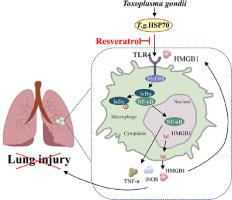Phytomedicine ( IF 6.7 ) Pub Date : 2022-10-22 , DOI: 10.1016/j.phymed.2022.154522 Yu Nan Lu 1 , Xin Yu Shen 1 , Jing Mei Lu 1 , Guang Nan Jin 1 , Hui Wen Lan 1 , Xiang Xu 1 , Lian Xun Piao 1

|
Background
Toxoplasma gondii is an opportunistic protozoan that can infect host to cause toxoplasmosis. We have previously reported that resveratrol (RSV) has protective effects against liver damage in T. gondii infected mice. However, the effect of RSV on lung injury caused by T. gondii infection and its mechanism of action remain unclear.
Purpose
In this work, we studied the protective effects of RSV on lung injury caused by T. gondii infection and explored the underlying mechanism.
Methods
Molecular docking and localized surface plasmon resonance assay were used to detect the molecular interactions between RSV and target proteins. In vitro, the anti-T. gondii effects and potential anti-inflammatory mechanisms of RSV were investigated by quantitative competitive-PCR, RT-PCR, ELISA, Western blotting and immunofluorescence using RAW 264.7 cells infected with tachyzoites of T. gondii RH strain. In vivo, the effects of RSV on lung injury caused by T. gondii infection were assessed by observing pathological changes and the expression of inflammatory factors of lung.
Results
RSV inhibited T. gondii loads and T. gondii-derived heat shock protein 70 (T.g.HSP70) expression in RAW 264.7 cells and lung tissues. Moreover, RSV interacts with T.g.HSP70 and toll-like receptor 4 (TLR4), respectively, and interferes with the interaction between T.g.HSP70 and TLR4. It also inhibited the overproduction of inducible nitric oxide synthase, TNF-α and high mobility group protein 1 (HMGB1) by down-regulating TLR4/nuclear factor kappa B (NF-κB) signaling pathway, which is consistent with the effect of TLR4 inhibitor CLI-095. In vivo, RSV improved the pathological lung damage produced by T. gondii infection, as well as decreased the number of inflammatory cells in bronchoalveolar lavage fluid and the release of HMGB1 and TNF-α.
Conclusion
These findings indicate that RSV can inhibit the proliferation of T. gondii and T.g.HSP70 expression both in vitro and in vivo. RSV can inhibit excessive inflammatory response by intervening T.g.HSP70 and HMGB1 mediated TLR4/NF-κB signaling pathway activation, thereby ameliorating lung injury caused by T. gondii infection. The present study provides new data that may be useful for the development of RSV as a new agent for the treatment of lung damage caused by T. gondii infection.
中文翻译:

白藜芦醇抑制弓形虫肺损伤、炎症级联及其作用机制的证据
背景
弓形虫是一种机会性原生动物,可感染宿主引起弓形虫病。我们之前曾报道,白藜芦醇 (RSV) 对弓形虫感染小鼠的肝损伤具有保护作用。然而,RSV对弓形虫感染肺损伤的影响及其作用机制尚不清楚。
目的
在这项工作中,我们研究了 RSV 对弓形虫感染引起的肺损伤的保护作用,并探讨了其潜在机制。
方法
分子对接和局域表面等离子体共振分析被用于检测 RSV 与靶蛋白之间的分子相互作用。在体外,使用感染弓形虫RH 株速殖子的 RAW 264.7 细胞,通过定量竞争性 PCR、RT-PCR、ELISA、蛋白质印迹和免疫荧光研究了 RSV 的抗弓形虫作用和潜在的抗炎机制。在体内,通过观察肺组织的病理变化和炎症因子的表达,评估RSV对弓形虫感染肺损伤的影响。
结果
RSV 抑制弓形虫负荷和弓形虫衍生的热休克蛋白 70 ( Tg HSP70) 在 RAW 264.7 细胞和肺组织中的表达。此外,RSV 分别与Tg HSP70 和 toll 样受体 4 (TLR4) 相互作用,并干扰Tg HSP70 和 TLR4 之间的相互作用。它还通过下调 TLR4/核因子 kappa B (NF-κB) 信号通路抑制诱导型一氧化氮合酶、TNF-α 和高迁移率族蛋白 1 (HMGB1) 的过量产生,这与 TLR4 抑制剂的作用一致CLI-095。在体内,RSV改善了弓形虫产生的病理性肺损伤感染,以及减少支气管肺泡灌洗液中炎症细胞的数量和 HMGB1 和 TNF-α 的释放。
结论
这些发现表明RSV在体外和体内都能抑制弓形虫的增殖和Tg HSP70的表达。RSV可通过干预Tg.HSP70和HMGB1介导的TLR4/NF-κB信号通路激活来抑制过度炎症反应,从而改善弓形虫感染引起的肺损伤。本研究提供的新数据可能有助于将 RSV 开发为治疗弓形虫感染引起的肺损伤的新药物。









































 京公网安备 11010802027423号
京公网安备 11010802027423号